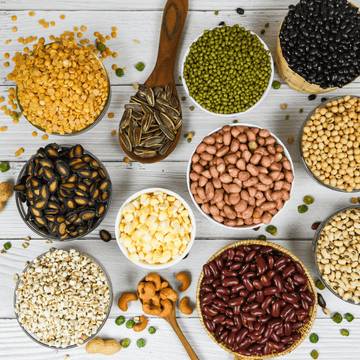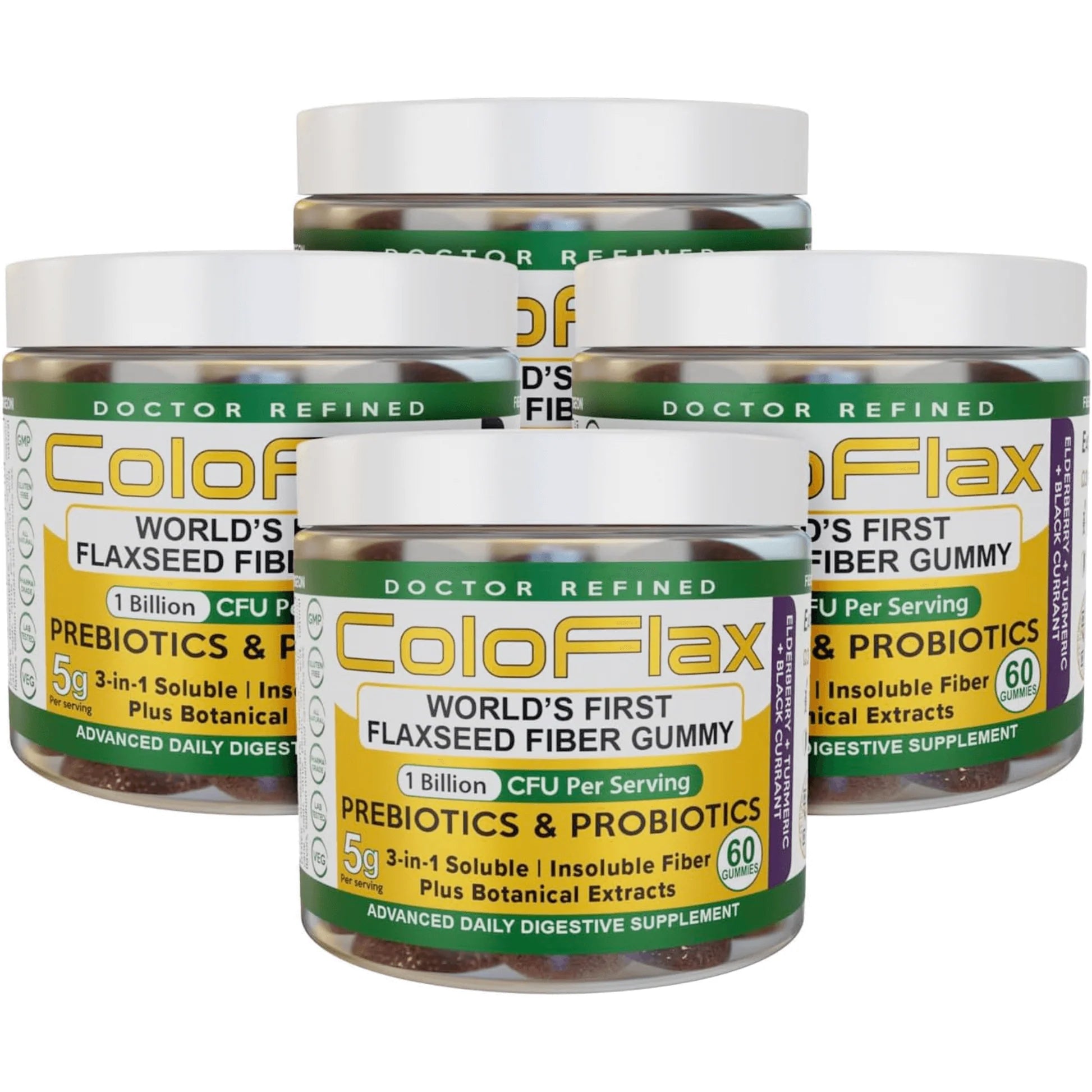We hear a lot about the importance of eating whole grains, with many cereal manufacturers extolling their benefits. But at the same time, grains have been demonized by certain dietary trends, and this has created a divide.
On the one side, you have people who avoid grains at all costs. On the other, there are those who insist that we should all be eating more grains, provided we focus on whole grains.
So, what does the science say, and are whole grains actually good for you?
What Are Whole Grains?
How can grains be good for you when many of the “bad” foodstuffs we’re warned about are made from grains? White bread, sugary cereal, cake—none of these things are healthy and yet they’re all made from wheat.
It’s important to note the distinction between refined grains and whole grains.
A grain is a kernel that contains three parts:
- Bran: The outer shell of the kernel. It is high in fiber and also contains nutrients and antioxidants.
- Germ: The inner layer. It contains a number of vitamins and minerals, as well as other healthy compounds.
- Endosperm: The middle layer, consisting mostly of carbohydrates.
Whole grains contain all of the above. As a result, they have carbohydrates, fiber, minerals, vitamins, and antioxidants.
Refined grains, on the other hand, remove the germ and bran, leaving only the carb-rich and nutrient-low endosperm. The bran is removed to make the grain easier to chew; the germ is removed to prolong the shelf life. The result is a product that lasts longer and is more suitable for processed food, but doesn’t contain any of the health benefits.
You’ll notice that breakfast cereals contain many vitamins and minerals. But these don’t come from the germ or bran. Instead, synthetic nutrients are sprayed onto the cereals to return some of those lost nutrients. These synthetic nutrients provide many of the same DVs, but as they are not in their natural form, they may not be as bioavailable or as beneficial.
Examples of Whole Grains
- Brown Rice
- Wild Rice
- Red Rice
- Bulgur Wheat
- Barley
- Oatmeal
- Quinoa
- Popcorns
- Millet

Generally, any grains that are whole and unprocessed are considered whole grains. You can also purchase whole-wheat flour and even whole grain cereals. The act of crushing/chopping the grain does not make it refined and so whole grains can come in many forms.
Examples of Refined Grains
- White Flour
- White Bread
- White Rice
- Corn Grits

Commercial products often use refined grains to prolong shelf life and produce a more neutral taste. But don’t assume that a product is made with whole grain just because it’s brown.
Molasses and colorants are often added to brown bread to give it that distinctive colorful. You can certainly buy bread made with whole grains, and it’s more nutritious than white bread, but a darker color doesn’t necessarily equate to a higher nutrient content.
What Are the Benefits of Eating Whole Grains?
There are a few criticisms levied at the consumption of whole grains, and they make for intriguing reading. However, studies suggests that whole grain consumption is beneficial for the human diet and could aid with everything from digestion to heart health.
They Are Rich in Fiber and Nutrients

We tend not to think of flour as being healthy. It’s a carbohydrate. It’s low in nutrients. And as it’s used to bake bread and cakes, we make peace with the fact that it’s not nutrient-dense.
But that only applies to refined flour.
A 3.5oz service of whole wheat flour contains over 13g of protein and nearly 11g of fiber. It is also a good source of selenium, copper, phosphorus, manganese, and B vitamins. And that’s not all.
Whole wheat contains plant compounds that could have an antioxidant effect. These include lignans, ferulic acid, phytic acid, and alkylresorcinols. These compounds eradicate harmful free radicals and could promote overall health and well-being.
We discussed lignans at length in our guide to the benefits of flaxseed. These compounds feature prominently in our ColoFlax fiber gummy and have been linked with many potential benefits.
They Could Support Digestive Health

Whole grain wheat is high in insoluble fiber, which has a prebiotic effect. It feeds the bacteria in your gut and helps them to perform their role optimally. (1)
Insoluble fiber also contributes to the bulk of your stool. It could shorten the time it takes for waste to move through your gut and form a healthier, bulkier stool, thus helping with both constipation and diarrhea.
If you struggle with digestive issues and regular bouts of constipation, consider eating a high-fiber whole grain breakfast. It could make a massive difference to your bowel habits, which in turn will have a knock on effect for other aspects of your health.
They Could Support Heart Health

Heart disease is the biggest killer in the United States, taking over three times more lives than accidents. Risk factors are largely related to diet and lifestyle, and fiber could play a big role in that. (2)
An analysis from 2006 noted that rates of cardiovascular disease (CVD) fall as fiber consumption increases. It also noted that “food sources of mainly insoluble fibers, primarily contributed by cereal products, have been the most consistently associated with lower incidence rates of CVD”. (3)
Another analysis from 2016 reported similar findings, but went a step further, noting that consumption of whole grains was associated with “a reduced risk of coronary heart disease, cardiovascular disease, and total cancer, and mortality from all causes, respiratory diseases, infectious diseases, diabetes, and all non-cardiovascular, non-cancer causes.” (4)
The average American already consumes a large number of grains. By swapping refined grains (white flour, cereal) for whole grains, they could significantly reduce their risk of contracting a number of chronic diseases.
They May Lower Your Risk of Strokes

Strokes killed over 160,000 Americans in 2020, which was more than diabetes and influenza/pneumonia combined. But this is another problem that could be improved with the introduction of whole grains.
A meta-analysis from 2015 looked at 247,487 participants and 1635 stroke cases and noted that higher consumption of whole grains has a protective effect, reducing the risk by 14%. (5)
They Could Help with Weight Loss

The CDC describes obesity as a “common, serious, and costly disease”. It’s a contributing factor for numerous chronic diseases, including heart disease, diabetes, and cancer, and as the rates of obesity climb, so does the prevalence of these diseases. (6)
Whole grain consumption could help with weight loss, with one study noting that “consumption of foods rich in cereal fiber or mixtures of whole grains and bran is modestly associated with a reduced risk of obesity.” (7)
Of course, that doesn’t mean that adding whole grains to your diet will help you to instantly shed pounds. The role they play is marginal and it’s largely the result of swapping refined grains for whole grains.
The additional fiber found in whole grains creates more bulk in your digestive tract, slowing down the digestive process and making you feel fuller for longer. If you’re more satiated, you’re less likely to binge on high-sugar and high-fat snacks, which is one of the main causes of obesity in the United States.
They May Lower Your Risk of Diabetes

A 2013 review found that people who swapped refined grains for whole grains experienced a notably reduced risk of type 2 diabetes. (8)
It’s thought that whole grains can help to lower fasting blood sugar levels while also contributing to weight loss.
What are the Downsides of Eating Whole Grains?
It’s easy to see why people are wary of refined grains and the potential damage they can do. A diet high in refined grains could contribute to obesity, diabetes, and a host of other diseases. But what about whole grains? Why is there a growing movement of people turning their backs on this seemingly healthy foodstuff?
There are a few different reasons.
Antinutrients
Antinutrients are naturally-occurring compounds that can hinder digestion and nutrient absorption. Whole grains contain several of these compounds and it has been argued that they may have a negative effect on digestion and health as a result.
However, these “anti-nutrients” break down with cooking, soaking, sprouting, and fermentation. What’s more, these compounds are not considered to be dangerous or even unhealthy when consumed as part of a balanced diet. They are also found in many other foodstuffs and they are not exclusive to grains. (9)
If you’re worried about antinutrients, just make sure you cook your grains before eating. You can also look into sprouted grains. These are now used to make all kinds of bread and provide the same great taste with kinder digestive properties.
They Contain Gluten

Celiac disease is an autoimmune disease whereby the body produces antibodies to attack one of the proteins produced by gluten. As gluten is a common component of wheat, rye, oats, and other grains, it means they need to abstain from all grains.
If you have celiac disease, grains are definitely not good for you.
The problem is that many people feel a little bloated after eating grains (often because the grains they are eating come from foods like bread and cake) and they immediately assume they have celiac disease. In truth, as little as 1% of the population actually has the condition while up to 25% adopt gluten-free diets as a result of a self-diagnosis. (10)
If you are not sensitive to gluten, there’s nothing wrong with it. Gluten is actually sold as a meat substitute in the form of seitan, which is made from wheat gluten.
They May Cause Inflammation

There has been some suggestion that grain consumption can increase inflammatory markers. However, these studies are not conclusive. Several studies have reported little to no increases in inflammation following grain consumption and others found that whole grains could actually reduce inflammation. (11)(12)
It’s all about moderation and ensuring that if you are eating grains, you’re eating the whole of the grain and combining it with a diet rich in fruits and vegetables.
Summary: Are Whole Grains Good for You?
There are a few criticisms levied at the consumption of whole grains, and they make for intriguing reading. However, studies suggests that whole grain consumption is beneficial for the human diet and could aid with everything from digestion to heart health.
Just remember that grains and whole grains are two completely different things, The latter contains a number of healthy compounds; the former strips all of these away.
References
- https://pubmed.ncbi.nlm.nih.gov/17761020/
- https://www.cdc.gov/nchs/fastats/leading-causes-of-death.htm
- https://pubmed.ncbi.nlm.nih.gov/16407729
- https://pubmed.ncbi.nlm.nih.gov/27301975/
- https://pubmed.ncbi.nlm.nih.gov/26629253/
- https://www.cdc.gov/obesity/data/adult.html
- https://pubmed.ncbi.nlm.nih.gov/23803885/
- https://pubmed.ncbi.nlm.nih.gov/24158434/
- https://www.ncbi.nlm.nih.gov/pmc/articles/PMC7600777/
- https://news.unl.edu/newsrooms/today/article/study-concludes-americans-self-diagnose-to-adopt-gluten-free-diets/
- https://academic.oup.com/ajcn/article/83/6/1369/4633049
- https://pubmed.ncbi.nlm.nih.gov/20668255/






